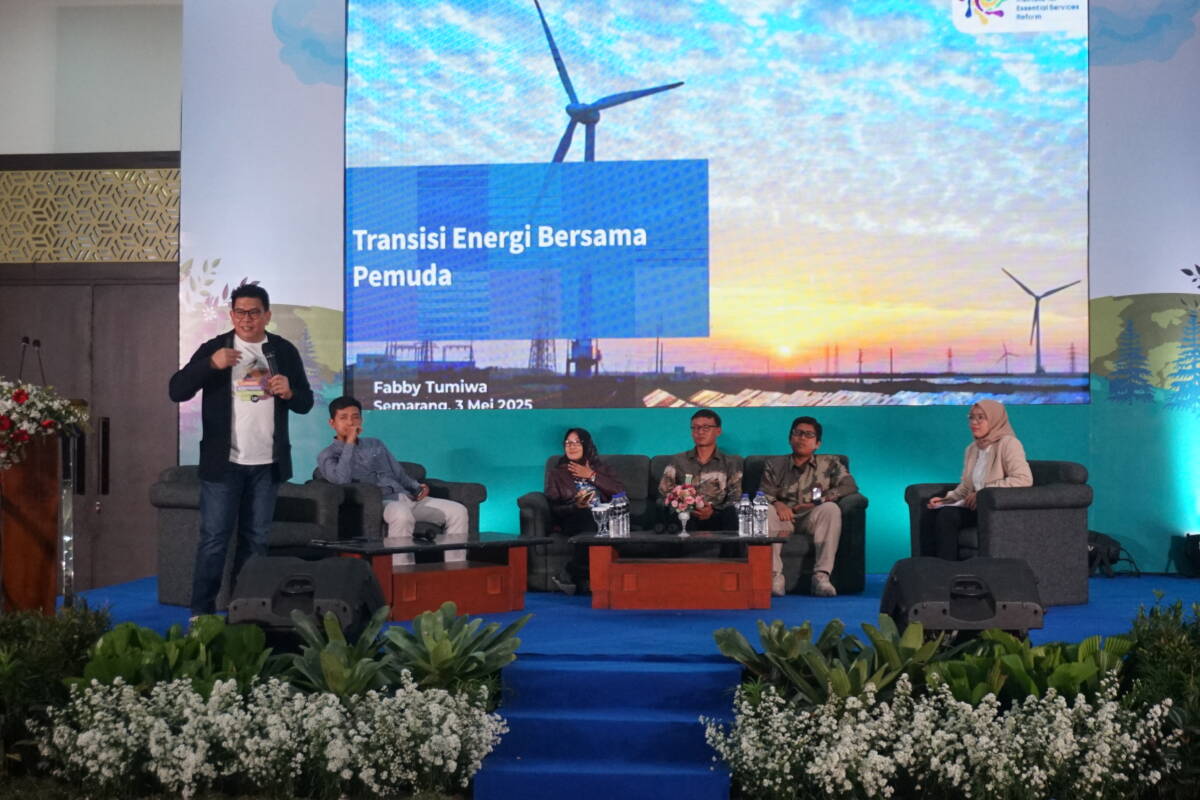Semarang, May 3, 2025 – The climate crisis is one of the biggest challenges facing the world today. However, amidst these challenges, there is a great opportunity for Indonesia to transform towards clean and sustainable energy. Behind this opportunity, there is one important force that must not be forgotten, namely young people.
Executive Director of the Institute for Essential Services Reform (IESR) Fabby Tumiwa stated that if Indonesia is committed to implementing a comprehensive decarbonization path, more than 800,000 new jobs will be created by 2030. This number is even projected to increase to more than 3.2 million jobs by 2050.
“This work is not only about technical personnel, but also covers various fields such as technology, management, communication, education, and green entrepreneurship. This is a great opportunity for the young generation of Indonesia to be part of the solution,” explained Fabby in a discussion at the Central Java Youth Sustainability Forum 2025 entitled Jejak Muda, Bumi Lestari: Ngopeni Ian Nglakoni Central Java Energy Transition with Youth Empowerment and Independent Energy Villages on Saturday (3/5). This event was held by the Institute for Essential Services Reform (IESR) in collaboration with the Central Java Provincial Energy and Mineral Resources Office.
In line with this, Fandi Gunawan Sianipar, Manager of IPP and Excess Power of PT PLN (Persero) Central Java Distribution Unit and D.I. Yogyakarta stated that young people can play an important role in spreading climate awareness through social media, communities, and education. Then, develop green technology, such as digital recycling applications and smart farming. Then, encourage green economic growth by building sustainable businesses or low-carbon startups.
“Young people can also play an active role in environmental, academic, and professional organizations, and increase their capacity to be ready to face the challenges of the energy transition,” said Fandi.
On the other hand, the enthusiasm for clean energy does not only come from big cities, but also from villages. In Karangpakis Village, Cilacap Regency, a renewable energy program is already underway. Misman Rofinninando, Head of the village’s Posyantik, explained that residents have utilized biogas from livestock waste for cooking needs.
“Some of the programs that have been carried out include 3 biogas points assisted by the Central Java Provincial Energy and Mineral Resources for 18 households, 2 biogas points from the Village Fund for 4 households, 15 biogas points assisted by the Indian Government using Sistema.Bio technology for 16 households, and 4 solar-powered street lights (PJU), “said Misman.
As a result, Misman stated, Karangpakis Village is now an example of an Independent Energy and Independent Fertilizer Village, because the community not only gets clean energy but also organic fertilizer from biogas waste. Household expenses are reduced because they do not need to buy LPG and chemical fertilizers.
Meanwhile, Arif Hendro, Regional Sales Manager, PT SUN Energy said that the COVID-19 pandemic has triggered awareness of the importance of economic recovery that is not only strong and healthy, but also environmentally friendly. One form is creating jobs that support sustainability.
Arif said that based on the National Energy General Plan (RUEN), Indonesia is targeting an additional energy capacity of 69,652 MW by 2030. Of that number, it is estimated that more than 1.72 million new job opportunities will be created. Solar energy is the most prominent. With an additional capacity of 14,200 MW, this sector is predicted to create 826,440 new jobs, making it the largest contributor of employment compared to other types of energy.
Not only that, Noni Arnee, Ekuatorial.com Journalist highlighted that the climate crisis and energy transition are no longer issues that are only discussed in conference rooms or academic seminars. Currently, environmental issues have entered the digital space and become part of public discussions.
“Therefore, in the digital era like today, the mass media and young people are not just observers, but the main drivers of change. With a smart, creative, and data-based approach, they are able to bring clean energy and environmental issues to the community. A sustainable future is no longer just discourse, it can be an opportunity that can be realized,” said Noni.

